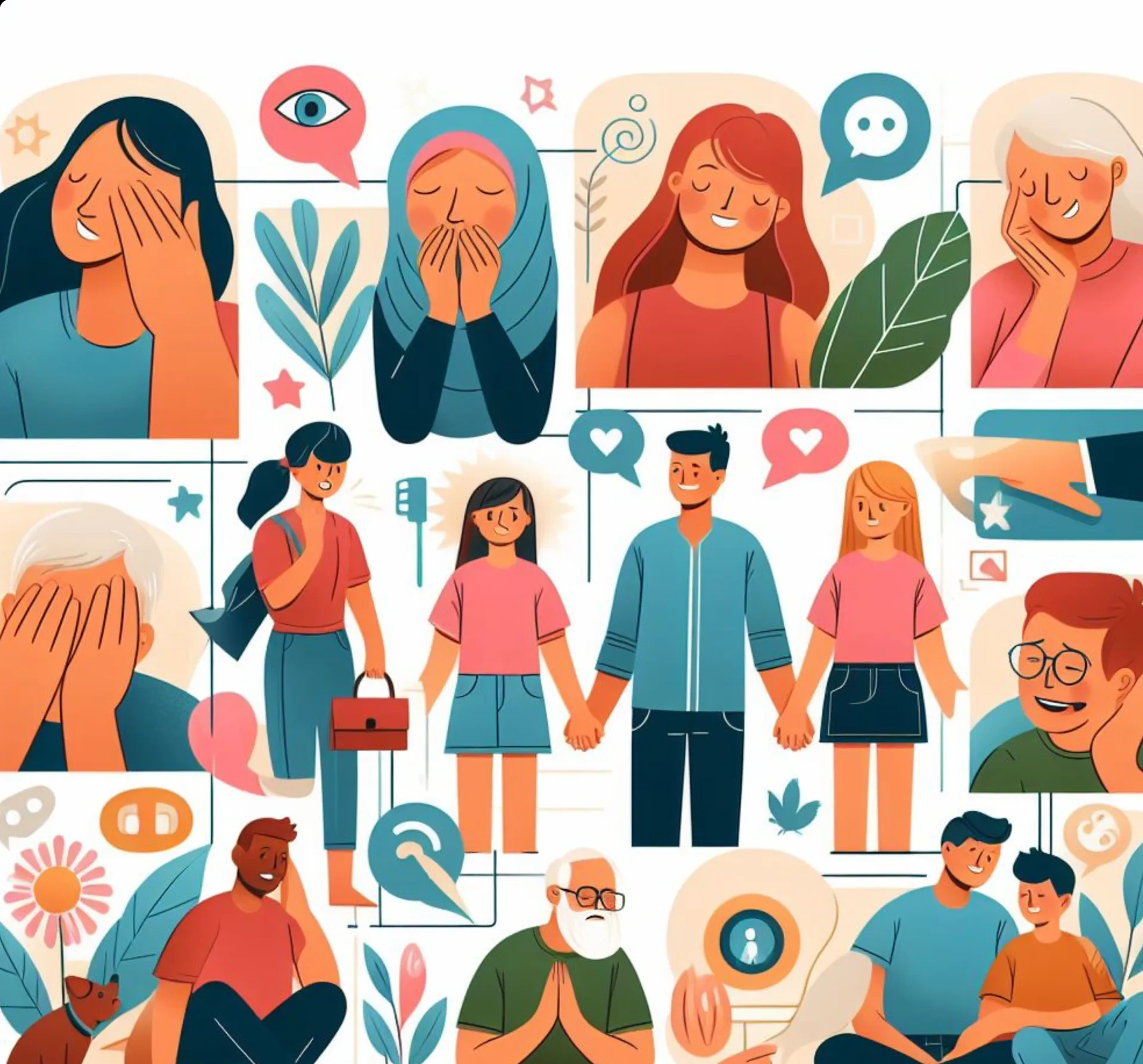Communication Skills That Make Relationships Easier

Communication skills are at the heart of every long lasting and easy to be in relationship. This article will give you an important insight into how to create the communication skills habits you want and if needed, change the ones that are not working for you.
When asked "What your # 1 relationship challenge is" couples respond: Communication
Surprisingly, when you do a Google search, there are relatively few sources to find the answers. Even a quick stroll through Amazon books will show a few books, but most of them cover a bigger scope than just communication.
My goal in this blog article is to make it crystal clear what you need to know about communication to have a great relationship. Yes, there is more about HOW to do it in programs I’ve created, but for now, you need a good foundation to set the stage. This blog will provide a good foundation to begin.
Take the time to study this article. There are timeless communication skills gems in this article, so I hope you will read it a few times. I want you to feel like you did not waste your time reading this article. I want you to say, “Now we are getting somewhere!”
So get you your favorite hot drink and settle in for a few minutes. I guarantee it’s worth the time you’ll take.
Where do we start? Let’s first look at some basic beliefs about being human that will set the framework and get us heading in the right direction.
The First Five To Seven Years Sets The Stage
The first 5-7 years of life, "lock in" the communication skills patterns you will use the rest of your life. Let me explain. Stay with me here, because this can seem a little technical, but if you can understand the implications of it, it will make a LOT of other things easier to grasp.
When the communication between your primary caretaker and you as the young child is optimal, meeting your unique needs, you will grow up believing you are loved, matter, and that you will get your needs met. And because of the way the implicit memory system works, this will become your default belief system. (remember this)
You default beliefs are stored in your “muscle memory.” The formal name for "muscle memory" is implicit memory or subconscious. It’s the memory that is on autopilot. Because of the nature of the implicit memory system, you often won’t realize you are continually tapping into it to make daily decisions. It’s like the water that surrounds the fish. It’s what causes your knee-jerk reactions when you don’t like something you hear. It’s what causes some people to react and others not to.
The reason this is important is, once you understand that the implicit or “muscle memory” system host all of the patterns you accumulated through the thousands of interactions that happened between you and the primary caretakers, you can then begin to see the importance of questioning your reactions.
This research is the key. And before I expand on that let’s look at another related principle that will serve you in being a better communicator. It has to do with taking responsibility.
When You Take Responsibility For Your Reaction to ANYTHING, You Get Your Power Back
You see, most people have never learned that they are responsible for the reaction they experience. Think about this for a moment. You have an experience. Through your eyes, ears, touch, taste, and smell you take in information. Then what do you think happens next?
You process the information.
What Does This Mean?
You rapidly compare what you just experienced and compared it against your memory system. Without you even realizing it, in milliseconds, you sifted through millions of pieces of information and made a decision based on past experiences. Your reaction or response is this decision.
Now the question is, who is responsible for this decision. The person who delivered the message or you? The answer is obvious. It’s you.
I’m not asking you to like what the person said I’m only recommending that you take responsibility for your reaction. It’s your mental processing that came up with the response so why not “own” it?
Therein lies a big secret to life happiness, attracting the right partner, and sustaining a long term relationship. You see, when you don’t take responsibility for your reaction, you cannot change how you react. If you blame the other person or organization or whoever, you instantly give up your power.
People that are feeling insecure and choose to blame or act as victims have not realized their personal power yet or how their internal memory system is running the show. When you feel insecure, there is a tendency to blame others or be a victim about some experience you don’t like. To the degree you do this, it’s what keeps you stuck in the old patterns.
However, when we take responsibility for ANY response we have, we can then shift the memories that are influencing our response. We can begin to question the validity of them. You see, when you are little, you did not have the ability to rationalize how to think about any perceived extreme situation.
When babies feel bad, they conclude they are bad. Nothing could be further from the truth. The problem is, they don’t have the ability yet to rationalize what else might be going on. When babies conclude they are bad, they later filter all challenging experiences in life through this lens.
As you might imagine this belief causes problems later in life, especially when difficult conversations come up. Imagine for a moment a person who has the belief that they are “bad” when something “bad” is about to happen? Why in the world would they want to talk about it? It would be like rubbing salt in the wound!
You have probably experienced partners who shut down and won’t talk when there is a challenging conversation that needs to happen. Maybe they get mad and storm out of the room? Maybe they shut down and won’t share? Maybe they go into blame mode and make you the enemy when you just wanted to sort things out?
The reactions can show up in hundreds of ways. What I want for you to understand today is where it comes from. It’s their implicit memories that are getting activated. The memories that are triggered can be belief systems, or habituated patterns learned from parents or peers. Regardless, they are that person’s memories. And it’s not always that they think they are bad, it can be a lot of other beliefs as well. For example, the belief they are not wanted or are unvalued or that they do not matter or are incapable.
Outdated information is the problem here. It is influencing the decision on how to behave or respond.
Right, about now you are probably asking "So now what?" Let’s find out.
How To Communicate To a Person Who Won’t Communicate
In the research I’ve done, the number one issue that couples complain about is partners that have poor communication skills. Let’s explore a very complex subject in as simple of terms as possible. But first, we must back up.
The time to decide if you want to confront the issue of poor communication skills is when you are first dating someone. Typically, the signs are there in the first six months of a relationship if you know what to look for.
One positive pattern to look for is do they initiate conversations that can be challenging and do they continue to reflect and adjust as you talk further about the challenges. You'll want to track much resistance do you experience related to adapting and change?
There are also negative types of patterns to look for that cause the most problems later: distancing patterns and anxious behavior patterns. I go much further into detail about this in my other programs.
Distancing patterns are behaviors that create a feeling like they are pushing you away or keeping you at a distance. Like not responding to messages very quickly (unless there is a prior agreement). Or allowing you to get close to them but then slowly, over a few months, creating intimacy breaks that seem to get longer and longer.
For example, things like not wanting to get together as much or not sharing the joy of your creative endeavors as much. Not wanting to talk about difficult issues that come up. Maybe less physical contact or words related to love.
It’s like they know how to pull you in but then keep you at arms distance. They might not leave a toothbrush or clothes at your place or want to hold hands in public.
(It is useful to know that our true nature is to love and connect. What changes this natural impulse is past hurts. Past hurts us to take on coping patterns that eventually turn into challenges we try and work out through intimate relationships. We can either get these lessons and change our internal belief systems (that implicit memory I referred to earlier) or cling to our old patterns even tighter thinking they will protect us.)
Another way to look at it is the past hurts that keep us stuck are reflected in our inability to accept others just as they are. It’s a choice to be with someone who won’t communicate well. It’s a choice to move on and find someone who does or stay with the person who doesn’t.
Most communication challenged couples, get this dynamic mixed up with incomplete issues with their parents. They remain in the relationship for the wrong reasons. Unconsciously they may be thinking, “if I can just resolve this then my parents will love me fully…” You see oftentimes we don’t realize that the incompletions we have with our families of origin get played out with our intimate relationships.
Let me give you an example to make this clear. If I’m a six-month-old and feeling scared my natural impulse is to cry and ask for help from the “big people.” If my primary caretaker doesn’t respond quick enough, I will eventually develop coping patterns. These patterns will stay with me until I am old enough and smart enough to question the belief(s) I'm acting out. These are the patterns that get’s played out in intimate relationships later in life.
If I were able to question my thinking at six months, I would have said something like, “Mom, why do you not come to me when I cry?” If I could rationalize, I would then realize this was something that had nothing to do with me, and while I may not like it, I could accept that mom has other things going on in her that are taking priority. I can still love my mom but not like her priorities. Two totally different things. I would then be resolved around this dilemma and not carry it into my future relationships.
As adults, we have the ability to rationalize and question our knee-jerk reactions. We are no longer the child that does not have the capacity to rationalize. We can question and test out our belief systems for accuracy and usefulness.
In the first few months of a new relationship, if there is something that bothers you, it is your responsibility to find out if the potential partner can talk it out. If they don’t live up to what you want, then you can make a choice to move on or see if they will work on it. In other words, you can accept them as they are or choose to date someone else. Are you starting to see how this comes together? (please comment below)
As you have probably already imagined everyone is in a different place as to what they can change in themselves or even want to change. Some people prefer to cling to their way of doing things. Others, through the school of hard knocks, prefer to see the situation as a learning opportunity so they can heal the old beliefs that no longer serve them.
It’s up to each of us to decide if we want to work out communication issues or move on. It’s that simple. A good practice is to imagine your partner in front of you and say to yourself, “They are not my parents, they are different.” Then feel that in your body until it becomes evident. This practice will help to release the unconscious "grip" it may have on you.
As an adult, each of us is responsible for clearing up these unconscious patterns to clear the way to have truly intimate relationships. It begins with accepting responsibility for this.
Finally, if you are currently in a relationship that struggles with healthy communication here are some suggestions to turn things around starting today.
- Make a commitment to hear each other out no matter what. While the scope of this article is not to go into detail about how to untangle the beliefs that hinder our ability to communicate, the practice of “listening to understand” will go a long ways in healing old dysfunctional beliefs. Practice just listening and not giving your opinion or perspective unless asked. Just listen. Interrupt your reaction. Just listen.
- Take an interest in what brings joy to your partner. This is a biggie. When you can listen for “what brings my partner joy in this conversation” you instantly increase intimacy. Feel into the other person as they tell you what excites them. Notice how good it feels for you to connect to their passion. Everything changed in my life when I began practicing this. Now, I love hearing about what brings joy to others. As they tell me what they did that day or week that was fun, I can sense their joy and just remain open to how good that feels to me and to celebrate with them. As they feel more and more heard, they will feel even closer to you and more likely to create a closer bond.
- Unplug blame and being a victim. Think of blame as the cancer of relationships. When we blame others, we are unconsciously sending the message “you are responsible for the way I feel,” and I am a victim. No one wants that burden nor cater to such a dysfunctional pattern. The tendency is to move away from people that blame or remain in a victim state. I know that it’s not easy but try and remember that we ALWAYS have a choice. We always have a choice as to how we want to think about ANYTHING. Remember, it’s the meaning we put on things that give it it’s power. Change the meaning you have about anything, and you quickly will learn the right direction to resolve any differences that might come up.
I think this is a good start. Check back later to see if I’ve added more to the article as I’d like to make it a complete one. To help out, post your questions and comments below. I will make additions to it as you provide feedback.
I hope you have found it useful. Be sure to share with your friends by clicking on the share buttons on the page. I thank you in advance for doing that. For now, many blessings on this journey and thanks for sharing part of that with me today.


